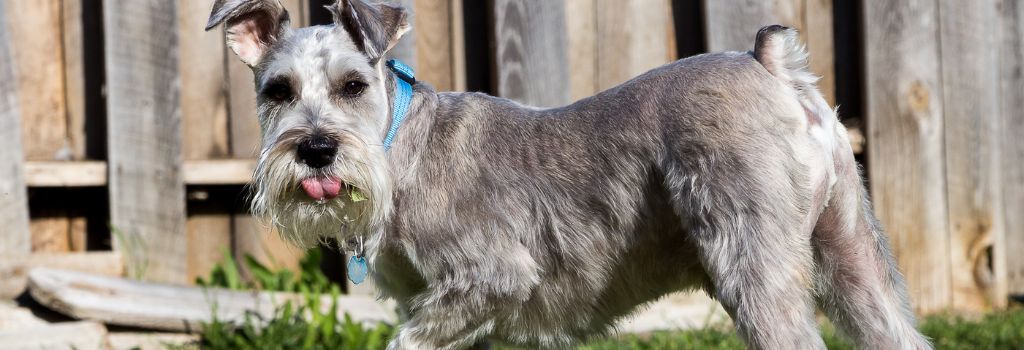
A small breed that packs a hefty punch of charm and wit—the Miniature Schnauzer. These pocket-sized pals are popular for a host of reasons, and if you're considering adding one to your family, here's what you should know.
Why Choose a Miniature Schnauzer?
If you're looking for an intelligent, playful, and energetic canine companion, look no further. Mini Schnauzers are smart cookies, eager to learn and please. They're fantastic watchdogs, always alert and ready to sound the alarm with their distinctive barks.
One of the best things about this breed? They have a hypoallergenic coat, which is a lifesaver for allergy sufferers. These little fur-balls are friendly, docile, and incredibly devoted to their human families. Plus, they're sturdy little guys, perfectly capable of holding their own.

But Hey, No Dog is Perfect
Just like us humans, Mini Schnauzers have their idiosyncrasies. They can get snappy when anxious and may be somewhat reserved around strangers. These dogs have little patience for harsh reprimands or negative-reinforcement training styles.
Another thing to note—your Mini Schnauzer will find her own fun if she gets bored. That might not be the kind of fun you appreciate, so keep her entertained. She's also prone to chasing small animals and digging, so be mindful of that if you have a garden or other pets.
Why We Love Them Anyway
Even with their quirks, Miniature Schnauzers are utterly loveable. With the right training approach, their spirited and active nature can be channeled into positive behaviors. They make fantastic, affectionate members of the family, blending well with both adults and children.
A Brief History Lesson
Originating in 19th-century Germany, the Mini Schnauzer was primarily a farm dog tasked with getting rid of vermin. These dogs are clever and often comedic, but they do have a mischievous side. They crave close human interaction and thrive in both country and urban settings. Their agility and desire to chase make them excellent candidates for dog sports like flyball and earth dog trials. As a generally healthy breed, their average lifespan is around 14 years.
So, if you're in the market for a pet that's both small and spunky, consider the Miniature Schnauzer. They’re social, trainable, and a whole lot of fun rolled into one compact package. Just be prepared for a dog that's bursting with personality!

Genetic Predispositions for Miniature Schnauzers
The Sweet Tooth
Diabetes mellitus is pretty common in dogs, and guess what? Mini Schnauzers are more susceptible than most. This tricky condition messes with the metabolism of sugars in the body, and your pup might require daily insulin shots. Key signs to look out for include increased eating, drinking, and frequent trips to the loo, all while losing weight. If you notice any of these symptoms, a vet visit is a must. Lab tests can confirm the diagnosis, and though treatment demands a commitment of time and resources, the good news is that well-regulated diabetic dogs can live just as long as their non-diabetic pals!
Liver Lingo: Unpacking Portosystemic Shunt (PSS) in Mini Schnauzers
Now, let's chat about something you might not have heard of but should definitely know about if you're a Mini Schnauzer parent—Portosystemic Shunt (PSS). In layman's terms, this liver disorder interferes with proper blood flow to the liver. If your little one has PSS, they won't be able to flush toxins effectively. The symptoms can be elusive, often showing as stunted growth or even seizures. A liver function test, especially before any anesthesia, is your go-to preventative measure. If diagnosed, treatments range from medication to surgery.
Cushing’s Disease: The Sneaky Steroid Scoundrel
Another medical term we should get familiar with is Hyperadrenocorticism, or what's easier on the tongue—cushings disease. This condition affects the adrenal glands, leading them to overproduce steroid hormones. Your Mini Schnauzer is at a higher risk for this, and the catch is that it develops slowly and sneakily. Initial symptoms could be as vague as increased thirst, urination, and a suddenly ravenous appetite. As the condition progresses, you might notice your pooch's skin thinning and a "potbelly" appearance. Treatment usually includes medication, which requires some dose-dance in collaboration with your vet.
When Blood Doesn’t Play Nice: Bleeding Disorders in Mini Schnauzers
Now, blood issues can be particularly scary because they often don't show until a crisis situation like an injury or surgery. Hemolytic Anemia and Thrombocytopenia are conditions where the immune system starts attacking your dog's red blood cells or platelets. This can lead to lethargy, paler gums, and bruising. If your vet suspects this, they will do specific blood clotting tests, especially before any surgery. Treatment often involves steroids and immune-suppressive drugs and in severe cases, emergency transfusions.

Keep the Beat: Heart Disease in Mini Schnauzers
Heart issues can sadly make an appearance both early and late in your Mini Schnauzer’s life. From murmurs to abnormal rhythms, these conditions can be a ticking time bomb if not detected early. Annual heart health checks can include X-rays, ECGs, or echocardiograms. Heart valve disease is especially common in older Mini Schnauzers and may require medication if diagnosed early. Maintaining good dental health and weight can be huge preventative measures.
Heart’s Electrical Woes: Sick Sinus Syndrome and Patent Ductus Arteriosis
If your Mini Schnauzer faints during exercise or has a super low heart rate, it might be suffering from Sick Sinus Syndrome. Another condition to be aware of is Patent Ductus Arteriosis. This congenital heart defect involves a vessel that doesn't close after birth as it should. Symptoms can range from mild to severe, including coughing and fatigue. Your vet will listen carefully during exams to catch these conditions early.
Bladder or Kidney Stones: A Stone-cold Issue for Mini Schnauzers
Did you know your furry best friend is more likely to develop bladder stones or kidney stones than other breeds? These stones are as uncomfortable for them as they sound. Signs like blood in urine, difficulty urinating, or straining to go could mean it's time for an emergency vet visit. Regular urine tests can help us catch these stones before they become a big issue, so let's keep an eye out and keep our fur-babies comfy!
Kidney Disease: Early Detection is Key
Unfortunately, Mini Schnauzers are susceptible to a sneaky kind of kidney disease called Glomerulonephropathy. It's an inherited condition that could lead to kidney failure if not caught early. So what can we do? Yearly urine analysis can be a game-changer! Detecting excess protein in the urine can be our first clue, and early detection often means a more straightforward and cost-effective treatment plan, which could include a special diet.
Digestive Disorders: When Tummy Troubles Strike
From their pancreas to their intestines, Mini Schnauzers could have a variety of digestive issues. Some symptoms, like constant vomiting or diarrhea, might even start appearing very early in life. Feeding them high-quality pet food and avoiding fatty or salty human treats can do wonders for their digestive health. And if you notice your pup regurgitating food that seems, well, unusually tube-shaped, it's time to check for megaesophagus, a condition where the food doesn't make it down to the stomach as it should.
Epilepsy: Understanding Seizures in Mini Schnauzers
Epilepsy can be a frightening subject for dog parents, and unfortunately, our Mini Schnauzers are more prone to it. Seizures come in different forms—reactive, secondary, and primary—and they typically begin showing up between six months and three years old. If you see your dog experiencing a seizure, make sure to keep them from injuring themselves and note the duration. Lifelong medication and regular blood tests often become part of managing this condition.

Allergies: More Than Just a Sneeze
Unlike humans, who sneeze and get itchy eyes from allergies, our Mini Schnauzers often suffer from itchy skin. They're prone to a skin allergy called "atopy," and if you see them licking their paws or rubbing their face more often, allergies could be the culprit. Don't fret; many treatments can keep these symptoms at bay.
Skin Disease: Battling the Itch
From dry to oily, skin conditions like seborrhea can be incredibly annoying for both your Mini Schnauzer and you. Besides making your dog uncomfortable, it can make them less cuddly due to an unpleasant smell. Causes can vary from low thyroid hormone levels to other diseases like Cushing’s, so it's crucial to identify the root problem for effective treatment.
Eye Problems: The Window to Their Soul
Last but not least, let's talk about those expressive Mini Schnauzer eyes. Sadly, these pups are prone to a host of eye issues, some of which can be painful or even lead to blindness. We'll be keeping a keen eye (pun intended) on them during regular check-ups to catch any potential problems early.
If you have questions and you'd like to reach out to us, you can call us directly at (970) 963-2826, or you can email us at [email protected]. Don't forget to follow us on social media Facebook, Instagram.
